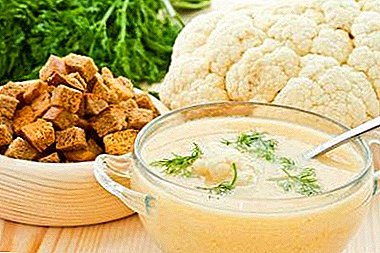 Many have heard of a fruit with an unusual exotic name cantaloupe. It turns out that the mysterious fruit is a melon, which has an amazing taste. In this article we will talk about how it looks cantaloupe melon, We describe its useful properties.
Many have heard of a fruit with an unusual exotic name cantaloupe. It turns out that the mysterious fruit is a melon, which has an amazing taste. In this article we will talk about how it looks cantaloupe melon, We describe its useful properties.
History of origin
Many people believe that Western Europe is home to cantaloupe. However, this is not quite true. Many years ago, Catholic monks took a melon from Armenia and presented it as an unusual exotic fruit Pope of Rome. This event dates back to the 15th century.
Read about the beneficial properties of exotic fruits such as kivano, guava, longan (dragon eye), papaya, lychee and pineapple.

The pontiff was very pleased with the taste of the melon and ordered that the fruit was grown in one of the Italian provinces - Cantaluppia. It is this area and played a role in the name of the melon.
Important! Young melon sprouts in appearance are very similar to clover, so weeding should be done very carefully so as not to remove the plant along with the weeds.Over time, cantaloupe began to appear on the shelves of all of Europe and America.
Description
This variety is characterized by powerful creeping bushes that have large leaves. Fruits may have a different shape: sometimes flattened, and sometimes smooth oval. Their weight ranges from 0.5 kg to 1.5 kg. They do not differ in large size - it is very rare to find a fruit more than 25 cm. The flesh has a dull orange color, very sweet in taste.
Maturation occurs in late August. Determine that the fruit is ready to be harvested by drawing attention to the stem - it can easily be separated from the melon. 
Useful and healing properties
Musk melon is not only tasty, but also very healthy fruit. Regularly eating it, the body will receive all the necessary nutrients that will certainly have a positive effect on immunity. Consider what effect are substances that are present in the composition of cantaloupe:
- Choline. Needed to improve memory. It is especially useful during pregnancy, as it is able to ensure the proper development of neural connections.
- Beta carotene. It is necessary to protect cells from radicals, helps to increase stress resistance and body resistance to harmful external factors.
Did you know? 25% of all melons consumed in the world are grown in China. Every year the country grows about 8 million tons of fruits.
- Zeaxanthin This substance acts as a protector of the eyes from ultraviolet radiation. Reduces the risk of developing cancer, prevents stroke and other heart diseases.
- Potassium. Able to lower blood pressure and bring it back to normal.
- Inosine. Strengthens the hair structure, prevents their loss, reduces the amount of fat and cholesterol in the liver.

With regular moderate consumption of fruit in food reduces the likelihood of obesity. The fruit is an excellent prevention of diabetes, heart disease, gastrointestinal tract, regulates the state of hormonal levels.
The hellebore, oregano (oregano), chervil, caraway, rocambol, loch, hops, oxalis, calendula and buttercups, as well as melon, have a beneficial effect on the cardiovascular robot.
Use in cooking
Thanks to the sweet pleasant taste, cantaloupe, shown in the photo, is eaten fresh. It is used to prepare various desserts, fruit and vegetable salads. You can use melon as a filling for baking.
Delicious honey can be made from cantaloupe fruits - it is called beckmes. You can also make sweet and aromatic jam, candied fruits, jam from melon.
Learn how to make compotes, jam and honey from a melon for the winter.

Important! For the entire period of cultivation, it is worthwhile to carry out 2 supplements with the help of nitrogen and phosphorus-potassium fertilizers: before the cantaloupe begins to bloom during flowering.Fruit seeds are used to obtain edible oil. Dried pulp is an amazing addition to a cup of tea.
Harm and contraindications
Cantaloupe in reasonable quantities can be used by almost all lovers of sweet fruit. However, people with individual intolerance to the product should consult a physician before using it. It is also recommended to exclude melon from the diet of patients with diabetes, gastrointestinal diseases and liver dysfunction. 
The nutritional value
We offer to get acquainted with nutritional value of melon.
- Water - 90.15 g;
- dietary fiber - 0.9 g;
- ash - 0.65 g
Vitamins in the fruit
The fruit contains the following vitamins:
- beta carotene - 0.202 mg;
- vitamin K - 2.5 mcg;
- Vitamin C - 36.7 mg;
- Vitamin B1 - 0.04 mg;
- Vitamin B2 - 0.02 mg;
- Vitamin B5 - 0.11 mg;
- Vitamin B6 - 0.07 mcg;
- Vitamin B9 - 21 micrograms;
- Vitamin PP - 0.73 mg;
- Vitamin B4 - 7.6 mg.

Thanks to the rich vitamin complex, you get all the necessary nutrients for the body.
Minerals
Consider which mineral substances and in what quantity includes cantaloupe:
- potassium - 267 mg;
- calcium - 9 mg;
- magnesium - 12 mg;
- sodium - 16 mg;
- phosphorus - 15 mg;
- iron - 0.21 mg;
- manganese - 0.21 mg;
- copper - 0.04 µg;
- selenium - 0.04 µg;
- fluorine - 1 µg;
- Zinc - 0.18 mg.

Did you know? Melon - one of the few fruits that does not ripen after harvest. No matter how much she lies, her taste will not become sweeter.After reading our article, you learned what a cantaloupe looks like, what kind of fruit it is, what useful properties it has. With moderate consumption of the fruit in food, it will have only a positive effect on your body.












